PhD position – Larval sensory evolution
Posted by Elizabeth Williams, on 24 August 2022
Job type: PhD
Location: University of Exeter, Marine Biological Association Plymouth, UK
Closing Date: 5 September 2022
A fully funded PhD position to study the evolution of larval sensory systems, jointly supervised by Dr Elizabeth Williams at the University of Exeter, UK, and Dr Vengamanaidu Modepalli at the Marine Biological Association, Plymouth, UK, is currently available. The PhD studentship will commence on 9 January 2023 or as soon as possible thereafter. For eligible students the studentship will cover Home tuition fees plus an annual tax-free stipend of at least £16,062 for 4 years full-time, or pro rata for part-time study. The student would be based in Biological Sciences at the Streatham Campus in Exeter and at the Marine Biological Association, (MBA), Plymouth, UK.
Project description: Most marine invertebrates have a biphasic lifecycle that includes a ciliated free-swimming larval stage that ultimately settles on the ocean floor and undergoes metamorphosis into a benthic juvenile. Understanding how these ciliated larvae navigate in response to environmental cues is key to modelling plankton migration. Most marine larvae have a ciliated sensory organ in their head known as the apical organ, which is thought to be responsible for the integration of environmental cues for navigation. Previous studies identified the apical organ as a regulator of the timing of the larval-juvenile transition of metamorphosis, but this function remains unconfirmed for most species. Despite its apparent evolutionary and ecological significance, the function, morphology and molecular fingerprint of the apical organ in early animals remains largely unexplored. This project aims to reconstruct the evolution of apical organs by comparing animals from different phyletic groups. The candidate will use largescale spatial gene expression analyses to compare the molecular nature of apical organs across larvae from sponge, cnidarian, and bilaterian species. Behavioural assays in combination with gene knockout/knockdown will be used to dissect the function of apical organ-specific genes and the apical organ in its entirety. These analyses will resolve the question of the common origin of apical organs across different animal phyla. Furthermore, results from this study will aid in investigating the role of sensory structures in larval swimming behaviour, settlement, and metamorphosis.

This award provides annual funding to cover Home tuition fees and a tax-free stipend. For students who pay Home tuition fees the award will cover the tuition fees in full, plus at least £16,062 per year tax-free stipend. Students who pay international tuition fees are eligible to apply, but should note that the award will only provide payment for part of the international tuition fee and no stipend.
International applicants need to be aware that you will have to cover the cost of your student visa, healthcare surcharge and other costs of moving to the UK to do a PhD.
The conditions for eligibility of home fees status are complex and you will need to seek advice if you have moved to or from the UK (or Republic of Ireland) within the past 3 years or have applied for settled status under the EU Settlement Scheme.
Applicants for this studentship must have obtained, or be about to obtain, a First or Upper Second Class UK Honours degree, or the equivalent qualifications gained outside the UK, in an appropriate area of science or technology. Prior experience in transcriptome data analysis and methods such as immunohistochemistry and in situ hybridization are advantageous, but training in these will also be provided on the project. Strong interest in the subject areas of larval biology, evolution, development and/or marine biology is essential.
If English is not your first language you will need to meet the required level (Profile B) as per our guidance at https://www.exeter.ac.uk/pg-research/apply/english/
Salary: £16,062 pa tax-free stipend plus Home tuition fees
Start date: 9 January 2023
Closing Date: 5 September 2022
Scientific fields: Evo-devo and eco-evo-devo, Neural development
Model systems: Other invertebrate
Duration: Fixed term
Minimum qualifications: First or Upper Second Class UK Honours degree or equivalent

